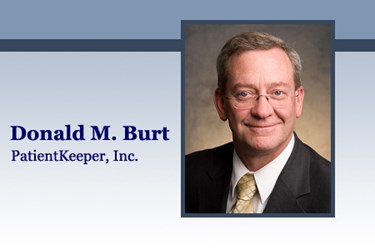Can IT Boost A Hospital's Physician Appeal?

By Donald M. Burt, MD, CMO, PatientKeeper, Inc.
EHR systems have a bad reputation in the view of most physicians. When I ran a physician group in western Massachusetts I heard a lot of complaints, and there’s a constant flow of stories in the media that reiterate those negative sentiments. Last month, the American Medical Association (AMA) launched a campaign using the hashtag #FixEHR to systematically compile physicians’ stories (mainly complaints) about their experiences using EHR systems.
So I’m always impressed when I speak with physician leaders at community hospitals who have found a way not only to defuse the complaints, but to turn information technology (IT) into a competitive advantage for physician recruitment and retention.
One such hospital is Community Memorial in Ventura, CA, which sits within a few miles of two other hospitals – one private, one public – creating a highly competitive market for both patients and physicians. Therefore differentiation is a strategic imperative for Community Memorial, and one way the hospital has opted to differentiate itself is to give physicians a significant voice in selecting the IT they use.
This engagement strategy was born of experience. Several years ago, when Community Memorial migrated its core hospital information system (HIS), physicians balked at using the new HIS’s EHR application, complaining that it was cumbersome and inefficient. So this time, Community Memorial convened a working group of IT and clinical leaders to investigate alternatives. The hospital’s IT director said the goal was to give physicians one system where they could do their entire workflow – a system that physicians wanted to go to, not something they were forced to go to. Physicians ultimately selected an overlay solution to their HIS – a purchase that was so important to the physicians that they opted to pay for it themselves.
The physician information system was so well received that physicians pushed the IT department to accelerate the deployment timelines, and the medical staff executive committee voted to use its digital chart exclusively. Today paper is no longer an option to document, order, sign off, or conduct any medical records activity at Community Memorial; a fully electronic workflow has become a reality.
The IT director called it “a big milestone.” He was thrilled that the push to transform came directly from the medical staff executive committee. Physicians, not IT, drove it based on their positive experience with the system. “That’s the way it should be,” he told me.
Significantly, the results of Community Memorial’s IT strategy contrast sharply with the situation down the block at a neighboring medical center, where the EHR roll-out and its impact on hospital operations and patient care have been the subject of a grand jury investigation. While such a situation is unusual, reports of negative impacts on physician productivity from an EHR deployment are not.
The initial reaction to AMA’s #FixEHR campaign clearly indicates physician dissatisfaction still runs rampant in the broader medical community, which is all the more reason to recognize the positive response physicians at Community Memorial have had to their hospital’s approach. The hospital’s CMO told me that, in recruiting residents to their GME program and new physician applicants to the medical staff, having a physician-friendly EHR makes a pivotal difference to physicians in deciding if they consider Community Memorial for their professional future. Without a robust inpatient EHR, they would look elsewhere. The leap between a usable EHR and physician alignment is a short one.
Because community hospitals in competitive markets are looking to increase patient referrals from local physicians, more hospital administrators should seek to make their facility the most physician-friendly of all the local options – and information technology can be an important element in the mix of factors that influence the “physician appeal” of a hospital.
About The Author
Donald Burt, MD is CMO at PatientKeeper, a provider of healthcare applications for physicians. Burt joined PatientKeeper in 2007, bringing 24 years of clinical, medical management, and medical information technology experience to the company. Previously, Burt served as President of Berkshire Faculty Services, the multispecialty physician practice group affiliated with Berkshire Health Systems, Vice President, McKesson Corporation, and Vice President and Medical Director of Health New England, a provider-owner HMO. Burt received a bachelor’s degree from Trinity College in Hartford, CT and his medical degree from UMDNJ. Burt is an Assistant Professor of Medicine at University of Massachusetts Medical School and holds board certifications in Internal Medicine and Geriatrics.
